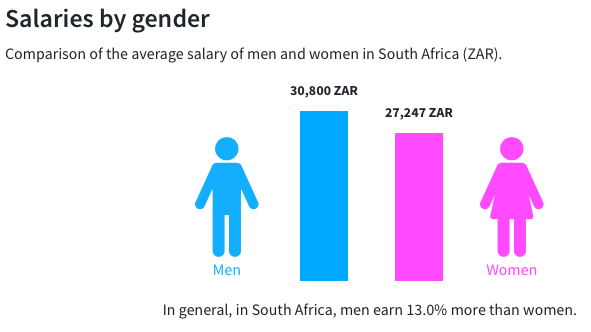Social media is still pushing the narrative of quick, easy, excessive wealth and while many count this as aspirational, it’s not always realistic or attainable, especially in a country like South ah! So before you risk it all and skip school to become the next TikTok sensation, there’s plenty of info people have put together to let you know what South African salaries really look like. For example, on April 18, 2024, the Kfm Mornings team aired a segment exploring industry-specific earnings, referencing insights from TikToker Boni Xaba, aka Lifereset_za.
As of 2024, the average monthly salary in South Africa is R26,894, reflecting a 1.6% increase from the previous quarter. The yearly increase rose by 2.3% from R26,298 in November 2022 to November 2023. However, inflation for goods has risen by 6.6% and services by 4%, making the cost of living more expensive despite salary increases. And as of March 2023, the minimum wage was R25.42 per hour. Employees typically see an 8% salary increase every 18 months, although this can vary by industry and company policies.
Low Basic Wage
While Pacsa recommends a minimum of R8,000 per month for a family of five, the Poverty Trends in South Africa report reveals that nearly 30 million South Africans, including 64.2% of Black South Africans, live below the poverty line. Many rely on low Basic Wages, with the median wage for Black South Africans insufficient for a nutritious diet. According to Mooney For Attorneys, Domestic Workers with a standard work schedule of 21 days per month, 8 hours per day, receive monthly earnings of R4,633 to R9,744.
The Highest Salaries
According to Time Camp, certain occupations offer high salaries due to specialised skills, leadership roles, and industry demand. Specialist Doctors, IT Managers, Legal Professionals, Engineering Managers, Financial Managers, Pilots, CEOs, Actuaries, Petroleum Engineers, and Marketing Directors are among South Africa’s top earners. While earnings can vary based on experience and performance, these roles offer lucrative salaries and opportunities for growth through career progression and skills development.
Education
While many Gen-Zers reckon University is a waste of time and money, currently, education plays a huge role in how much you eventually make. Research shows that higher levels of education typically result in higher earnings. For instance, individuals with bachelor’s degrees earn 24% more than those with diplomas, while master’s degree holders earn 29% more than bachelor’s degree holders. Moreover, those with PhDs earn 23% more than master’s degree holders. These findings prove the importance of investing in education for long-term career growth and earning potential.
The Gender Pay Gap
Despite legislative efforts like the Employment Equity Act, the gender wage gap persists. Women typically earn 15% to 30% less than men due to factors like discrimination, industry differences, and disparities in work experience and hours. Initiatives aim to increase female representation in higher-paying sectors and improve work-life balance, but challenges in enforcement remain. Closing the gap is crucial for gender equality and economic empowerment, benefiting productivity and reducing poverty rates.
Emerging Industries
An Analytico’s survey of over 3,000 IT professionals in SA indicates that most tech workers, including entry-level positions, earn well above the country’s average salary. Key findings include salary increases for 46% of respondents and bonuses for 52%. On average, full-time workers earn R63,430 per month, far surpassing the national average. The survey covers various tech fields and experience levels, offering insights into the industry’s salary landscape and highlighting salary disparities across different job categories and levels.
The Creative Industry
You’ll find that seldom are creative industries mentioned in SA salary stats. According to Talent.com, the average monthly salary for creative arts professionals in 2024 is R20,400, which translates to R126 per hour. Of course, there are a range of creative roles and many of them are freelance. Some positions include Directors earning R65,000, Marketing Managers earning R40,000, Production Managers earning R37,500, Sales Managers earning R35,000, Account Managers earning R30,000, and Account Executives earning R25,000.

Musicians
On a less corporate level, Mywage.co.za, part of the WageIndicator Foundation, reported that highly skilled musicians, singers, and composers earn between R7,057 and R35,593 per month in 2024. Entry-level wages range from R7,057 to R17,242 per month, increasing to R9,049 to R20,918 after 5 years of experience. Responsibilities include composing, arranging, conducting, and performing musical compositions, among others. Nobody’s saying you should give up on your dream of superstardom, just understand your options.
Influencers
In 2018, News24’s James de Villiers reported that South African influencers can earn between R500 and R10,000 per Instagram post, with the market expected to grow significantly by 2022. According to Indeed, the average salary for a South African influencer is merely R19,628 per month. But before you go buying followers, remember that brands pay based on audience demographics rather than just follower count, and agencies often reach out directly to influencers based on quality content and engagement.
Only Fans
According to SAFacts.co.za, the average earning of an OnlyFans content creator in South Africa is between R2,600 and R3,700 per month, with top creators like Xoli Mfeka making up to R90,000 monthly. While beginners typically earn around R2,600 monthly, that income is subject to VAT in South Africa. You can join and earn on OnlyFans without showing your face, but success depends on effort and content quality and is more likely for creators with large and loyal followings.

Of course, we encourage you to stay hungry and shoot for the stars, but if you’re entering the job market, arming yourself with this knowledge helps in setting realistic expectations and making informed career decisions. Plus, knowing what people are generally earning might provide insight into spending habits and how to manage your budget. While some professions earn significantly more than others, the rising cost of living continues to challenge many South Africans and overcoming these challenges begins with awareness.
*Thumbnail Image courtesy of Lionize



















































